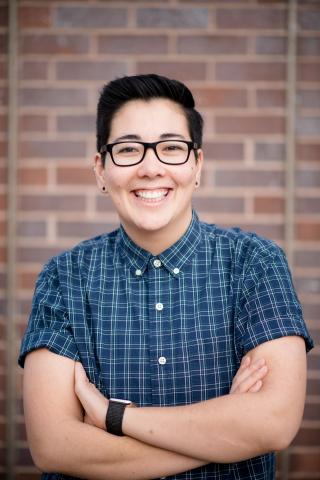
Post-Doc Fellow Pioneers Support Program for Parents of Trans Youth
PAU Researcher Focuses on Parents as Major Factor in Trans Youth Mental Health and Well-Being
Read Article from Yes, Magazine
Em Matsuno, PhD, and PAU’s first Postdoctoral Fellow with the Center for Evidence-Based Applied Research (CLEAR), has developed a program aimed at increasing support among parents of trans youth. The Parent Support Program consists of three modules that build upon each other, starting with the parent’s own emotional process, followed by increasing knowledge and empathy toward trans youth, and, finally, a skills-based module that focuses on supportive behaviors.
“It's important for all parents to be informed on issues related to gender and trans youth because, first of all, you never know what your child's gender journey is going to be,” says Dr. Matsuno, who began working on the program prior to joining PAU.
“Parents have a lot of power in terms of being able to monitor their child’s gender expression and dictate whether they're able to access gender affirming medical care,” said Dr. Matsuno. “Therefore, parental support has a large impact on whether the child is able to live authentically from a younger age which can decrease ongoing gender dysphoria.”
Dr. Matsuno started the project when they were a doctoral student at UC Santa Barbara. They did a pilot study with 27 parents and gathered feedback. Matsuno is currently conducting a larger efficacy study and has recently received broad media attention, from The Conversation, EDGE Media Network, and Yes! Magazine.
Dr. Matsuno identifies as a nonbinary, queer, person of color and uses they/them pronouns. In another interview, they reference "possibility models," a term actress and activist Laverne Cox uses instead of “role model.”
“As a younger person I didn't have very many possibility models. I grew up in a very rural town in Wyoming where I didn't know any other queer people for most of my youth. I remember, however, when I was a senior in high school for one of my classes, I did an interview with a nonbinary college student and I learned about nonbinary identities for the first time. That just really stood out as a huge aha moment for me. Later that year, I did a presentation in class on deconstructing the gender binary and wore a button up shirt and tie. It was definitely a moment of gender euphoria for me.”
In addition to developing the Parent Support Program for parents of trans youth, and conducting LGBTQ+-focused research, Matsuno also finds it important to “to uplift and support other trans and nonbinary graduate students and professionals so we can be at the center of conducting research and providing healing for our own communities.”
Since June is also Pride Month, we asked Dr. Matsuno to share resources for trans youth, their families and allies, and anyone wishing to deepen their knowledge. They suggested several books: "Redefining Realness" by Janet Mock, "Stone Butch Blues" by Leslie Feinberg, "Beyond the Gender Binary" by Alok Vaid-Menon, and "A Transgender History" by Susan Stryker. Matsuno also suggests tuning into TV shows "Pose," "These Themes," or "Transhood," and following Instagram accounts _steviewrites, thetranstherapist, alokvmenon, or them.
What can parents do to make our homes, schools, and communities better for trans (and LGB+) kids? Matsuno offers these suggestions:
- “Parents can educate themselves and become familiar with trans communities, get to know trans people, and start to follow trans media.”
- “Listen to trans youth and trust them to know what is right for them.”
- “Start to recognize the gendered assumptions that we make such as making an assumption about somebody's gender based on their appearance and work to change those assumptions and biases.”
- “Also, changing our language to be more gender inclusive can really change the way we think about gender.”
“I think all of those little things can go a long way,” said Dr. Matsuno. Most poignantly, they suggested: “Make your love and support explicit and unconditional.” Parents can learn more about the Parent Support Program on Facebook. They can even sign up for the study here.
